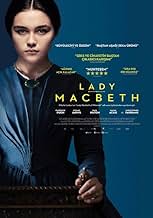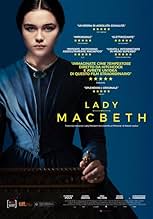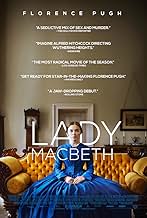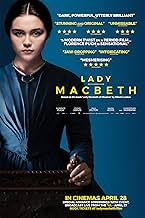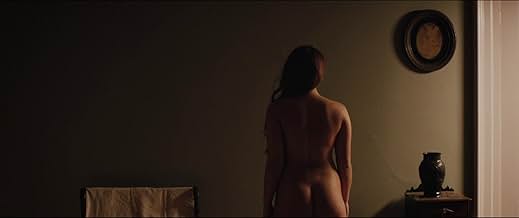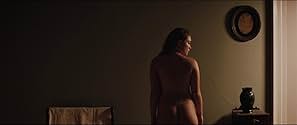En la Inglaterra rural del siglo19, una joven novia a la que han vendido en matrimonio descubre deseos irrefrenables en sí misma cuando se involucra en una aventura romántica con un trabajad... Leer todoEn la Inglaterra rural del siglo19, una joven novia a la que han vendido en matrimonio descubre deseos irrefrenables en sí misma cuando se involucra en una aventura romántica con un trabajador de la finca.En la Inglaterra rural del siglo19, una joven novia a la que han vendido en matrimonio descubre deseos irrefrenables en sí misma cuando se involucra en una aventura romántica con un trabajador de la finca.
- Dirección
- Guionistas
- Elenco
- Nominada a2premios BAFTA
- 24 premios ganados y 58 nominaciones en total
Kema Sikazwe
- Farmhand
- (as Kema Slkazwe)
- Dirección
- Guionistas
- Todo el elenco y el equipo
- Producción, taquilla y más en IMDbPro
Opiniones destacadas
This film tells the story of a young woman who is sold into a loveless marriage with an older wealthy gentleman. She has a passionate affair with a servant of the house. The promise of a happier life eludes her, until she takes full control of the situation.
Initially I thought the film was really about Macbeth's wife, but I soon learn that it is not the case. The title comes from the similar ruthlessness and cold bloodedness that the leading woman and Lady Macbeth have. It is engaging to see how Katherine transforms from a timid woman into a sociopathic woman who will stop at nothing to get what she wants. The pacing is a little slow, with artistic shots lasting 10 or even 20 seconds but does not really help story telling. Overall, the story is good and Katherine's character is very interesting.
Initially I thought the film was really about Macbeth's wife, but I soon learn that it is not the case. The title comes from the similar ruthlessness and cold bloodedness that the leading woman and Lady Macbeth have. It is engaging to see how Katherine transforms from a timid woman into a sociopathic woman who will stop at nothing to get what she wants. The pacing is a little slow, with artistic shots lasting 10 or even 20 seconds but does not really help story telling. Overall, the story is good and Katherine's character is very interesting.
I was enthralled by this movie from start to finish. The cinematography and sound were excellent. The complete absence of a music soundtrack except for two notable atmospheric crescendos added to the overall oppressiveness of the story and the location. All of the performances were excellent and the lead was outstanding IMO. The story was in many ways familiar - being evocative of Bronte and Hardy - with its portrayal of Victorian country gentry and the brutality and sense of entitlement that sometimes occurred between the classes but the way the story unfolded frequently surprised me by not following through in the way one might have expected it to. I too would recommend a cinema viewing in order to get the full effect of the landscape and the oppressive silence of the house.
Looking at the title, you might think director William Oldroyd's Lady Macbeth is about revenge, lust, murder, and boredom, and you would be right on all counts. Katherine (Florence Pugh), a 19th century teen bride of an arranged marriage to a middle-aged drunk, can't get no satisfaction. Her husband is impotent for starters, and the estate is so forbidding murder would seem to be a required pastime.
Yet, sex is the prime mover here, where she discovers randy groomsman Sebastian (Cosmo Jarvis), and takes him to bed in the long absence of her hubby. Meek black Anna (Naomi Ackie), Katherine's servant, observes the shenanigans, much as we do, unable to change what she sees will be an outcome unpleasant to the core. To the end Anna is faithful to Katherine, a slave to a mistress who is herself a slave to men and convention.
Several archetypal themes arise in this somber, artfully-photographed drama. For instance, one that emphasizes the wages of sin is prominent; another about the subjugated rising against the oppressor; and another about the danger of socially imprisoning smart women in a paternalistic society. A leitmotif also surfaces about the dangers of debilitating class distinctions, which are never a good thing in the long haul.
Ari Wegner's cinematography is portrait-like if considering only the recurring shot of Katherine sitting on her Victorian couch in a consuming dress that seems to deteriorate with each similar shot. Underneath the dress is the corset, so long a symbol of the era's tight hold on women.
Remembering Amma Asante's Belle, I'm pleased to see another art- film treatment of fraught race relations in merry ol' England. That none of this will ever stop is promised in the spawn of the miscreants, children of evil destined to repeat their parents' sins.
Lady Macbeth is an interesting minimalist story of a smothered young woman, whose intensity will lay waste to the social fabric of the estate. In fact, much of the proceedings are Shakespearean with their emphasis on man's weakness in his dominance, a woman's Eve-like ability to lure men into sin, and the pride that inevitably leads to a fall.
Depressing but dramatically satisfying.
Yet, sex is the prime mover here, where she discovers randy groomsman Sebastian (Cosmo Jarvis), and takes him to bed in the long absence of her hubby. Meek black Anna (Naomi Ackie), Katherine's servant, observes the shenanigans, much as we do, unable to change what she sees will be an outcome unpleasant to the core. To the end Anna is faithful to Katherine, a slave to a mistress who is herself a slave to men and convention.
Several archetypal themes arise in this somber, artfully-photographed drama. For instance, one that emphasizes the wages of sin is prominent; another about the subjugated rising against the oppressor; and another about the danger of socially imprisoning smart women in a paternalistic society. A leitmotif also surfaces about the dangers of debilitating class distinctions, which are never a good thing in the long haul.
Ari Wegner's cinematography is portrait-like if considering only the recurring shot of Katherine sitting on her Victorian couch in a consuming dress that seems to deteriorate with each similar shot. Underneath the dress is the corset, so long a symbol of the era's tight hold on women.
Remembering Amma Asante's Belle, I'm pleased to see another art- film treatment of fraught race relations in merry ol' England. That none of this will ever stop is promised in the spawn of the miscreants, children of evil destined to repeat their parents' sins.
Lady Macbeth is an interesting minimalist story of a smothered young woman, whose intensity will lay waste to the social fabric of the estate. In fact, much of the proceedings are Shakespearean with their emphasis on man's weakness in his dominance, a woman's Eve-like ability to lure men into sin, and the pride that inevitably leads to a fall.
Depressing but dramatically satisfying.
If I were the producer of this film, I'd have chosen a different title. I'm sure lots of moviegoers are going to be misled: this film has nothing to do with Shakespeare. It's an adaptation of a novel by the Russian author Nikolai Leskov, set in early 19th century England.
The film seems to be a pre-feminism manifesto for women's rights. It shows Katherine Lester, the submissive wife of a wealthy but abusive landowner, living in a secluded manor in the British countryside. During a prolonged absence of her husband, she rediscovers her freedom and starts an affair with one of the stable boys. Not willing to give up her newly acquired status, she starts a series of increasingly extreme actions.
The interesting thing is how Katherine evolves from victim to culprit. She seems to have learned from her husband how to use and misuse power. The lack of social conscience of which she at first is a victim, becomes a driving force for her own behaviour. Her selfishness and lack of morality is so extreme that, in the end, she betrays innocent servants. The viewer has to shift his allegiances: at first, it's impossible not to sympathize with Katherine, enjoying a free life without her heartless husband. But halfway through the film, it becomes clear that Katherine is just as heartless, as soon as she is in power.
The story is filmed in a very effective, sober style with beautiful cinematography. The lack of any music is remarkable: some elongated scenes are striking because of the silence. The oppressive atmosphere in the manor is emphasized by the camera work. The camera repeatedly shows scenes from exactly the same viewpoint. Four or five times, we see the servant Anna entering Katherine's bedroom in exactly the same way.
As much as 'Lady Macbeth' is about gender, it is also about class. It is striking that Katherine, who as a woman is considered a lower form of human life by men, herself considers the servants to be a lower form of human life. She shamelessly uses them for her own purposes and enjoyment, but doesn't care at all about their fate afterwards.
'Lady Macbeth' is a beautiful film, about issues that even nowadays are worth thinking about. But I would have named it 'Lust and loneliness' - after all, it's set in the same period as the Jane Austen novels.
The film seems to be a pre-feminism manifesto for women's rights. It shows Katherine Lester, the submissive wife of a wealthy but abusive landowner, living in a secluded manor in the British countryside. During a prolonged absence of her husband, she rediscovers her freedom and starts an affair with one of the stable boys. Not willing to give up her newly acquired status, she starts a series of increasingly extreme actions.
The interesting thing is how Katherine evolves from victim to culprit. She seems to have learned from her husband how to use and misuse power. The lack of social conscience of which she at first is a victim, becomes a driving force for her own behaviour. Her selfishness and lack of morality is so extreme that, in the end, she betrays innocent servants. The viewer has to shift his allegiances: at first, it's impossible not to sympathize with Katherine, enjoying a free life without her heartless husband. But halfway through the film, it becomes clear that Katherine is just as heartless, as soon as she is in power.
The story is filmed in a very effective, sober style with beautiful cinematography. The lack of any music is remarkable: some elongated scenes are striking because of the silence. The oppressive atmosphere in the manor is emphasized by the camera work. The camera repeatedly shows scenes from exactly the same viewpoint. Four or five times, we see the servant Anna entering Katherine's bedroom in exactly the same way.
As much as 'Lady Macbeth' is about gender, it is also about class. It is striking that Katherine, who as a woman is considered a lower form of human life by men, herself considers the servants to be a lower form of human life. She shamelessly uses them for her own purposes and enjoyment, but doesn't care at all about their fate afterwards.
'Lady Macbeth' is a beautiful film, about issues that even nowadays are worth thinking about. But I would have named it 'Lust and loneliness' - after all, it's set in the same period as the Jane Austen novels.
As "Lady Macbeth" (2016 release from the UK; 90 min.) opens, we see a young woman (we later learn her name is Katherine) getting married in what looks to be 19th century England. On her wedding night, she is left untouched by her (older) husband. Her father-in-law, also living there, is equally unpleasant. Katherine is utterly lonely and depressed. Then one day, both her husband and father-in-law must go out of town for business. It's not long before Katherine strikes up a torrid affair with one of the groomsmen. At this point we're about 10 min. into the movie. What will become Katherine and her lover? To tell you more of the plot would spoil your viewing experience, you'll just have to see for yourself how it all plays out.
Couple of comments: you may think this is yet another movie adaptation of the Shakespeare play, but in fact this is based on the Russian novel Lady Macbeth of the Mtsensk District by Nicolai Leskov. I will leave it to the Shakespeare experts to comment how different this story is from Shakespeare's. What I can say is this: the movie is very much story-driven. Things happen, and happen fast, and it doesn't let up! There is hardly any music in the film. Another unusual fact: the movie does not have a title. There are no opening credit, and when the end titles start, it simply says "Based on Lady Macbeth of the Mtsensk District by Nicolai Leskov", and that's it. (The Katherine character is regularly referred to as "Mrs. Lester" or maybe that should be "Leicester".) The star of the movie for sure is Florence Pugh, an up-and-coming British actress, whom I can assure you we will see plenty more of (she reminds me of a young Kate Winslett). Played by Pugh, Katherine is passionate and ruthless. Last but not lest, the movie was filmed (according to the end titles) in Northumberland, the area just below the border with Scotland, just beautiful.
"Lady MacBeth" premiered at the 2016 Toronto International Film Festival to positive buzz. It finally opened this weekend at my local art-house theater here in Cincinnati, and I couldn't wait to see it. The Friday early evening screening where I saw this at was attended dismally (4 people, including myself), which does not bode well for this movie, considering it was the opening night. That's a shame. Maybe this will gather a larger audience through Amazon Instant Video, or eventually on DVD/Blu-ray. If you like a strong story-driven movie with great acting, you could do a lot worse than this particular "Lady MacBeth"!
Couple of comments: you may think this is yet another movie adaptation of the Shakespeare play, but in fact this is based on the Russian novel Lady Macbeth of the Mtsensk District by Nicolai Leskov. I will leave it to the Shakespeare experts to comment how different this story is from Shakespeare's. What I can say is this: the movie is very much story-driven. Things happen, and happen fast, and it doesn't let up! There is hardly any music in the film. Another unusual fact: the movie does not have a title. There are no opening credit, and when the end titles start, it simply says "Based on Lady Macbeth of the Mtsensk District by Nicolai Leskov", and that's it. (The Katherine character is regularly referred to as "Mrs. Lester" or maybe that should be "Leicester".) The star of the movie for sure is Florence Pugh, an up-and-coming British actress, whom I can assure you we will see plenty more of (she reminds me of a young Kate Winslett). Played by Pugh, Katherine is passionate and ruthless. Last but not lest, the movie was filmed (according to the end titles) in Northumberland, the area just below the border with Scotland, just beautiful.
"Lady MacBeth" premiered at the 2016 Toronto International Film Festival to positive buzz. It finally opened this weekend at my local art-house theater here in Cincinnati, and I couldn't wait to see it. The Friday early evening screening where I saw this at was attended dismally (4 people, including myself), which does not bode well for this movie, considering it was the opening night. That's a shame. Maybe this will gather a larger audience through Amazon Instant Video, or eventually on DVD/Blu-ray. If you like a strong story-driven movie with great acting, you could do a lot worse than this particular "Lady MacBeth"!
¿Sabías que…?
- TriviaFlorence Pugh said she loved her nude scenes in this film. Pugh reflected on her breakout role during an interview for Britain's ES Magazine and admitted the part "changed everything" for her. "I loved the fact she was naked all the time. At that point in my life, I had been made to feel shit about what I looked like and that film was perfect. There was no room for me to feel insecure."
- ErroresA Cornish Rex cat first appears at 14:30. The breed first appeared around 1950.
- ConexionesFeatured in The EE British Academy Film Awards (2018)
- Bandas sonorasPraise to the Lord, the Almighty
(uncredited)
German folk tune
Lyrics by Joachim Neander, translated by Catherine Winkworth
Selecciones populares
Inicia sesión para calificar y agrega a la lista de videos para obtener recomendaciones personalizadas
- How long is Lady Macbeth?Con tecnología de Alexa
Detalles
- Fecha de lanzamiento
- Países de origen
- Sitios oficiales
- Idioma
- También se conoce como
- Леді Макбет
- Locaciones de filmación
- Lambton Castle, Chester-le-Street, County Durham, Inglaterra, Reino Unido(The Lesters' home)
- Productoras
- Ver más créditos de la compañía en IMDbPro
Taquilla
- Presupuesto
- GBP 500,000 (estimado)
- Total en EE. UU. y Canadá
- USD 1,129,408
- Fin de semana de estreno en EE. UU. y Canadá
- USD 64,537
- 16 jul 2017
- Total a nivel mundial
- USD 5,343,632
- Tiempo de ejecución1 hora 29 minutos
- Color
- Relación de aspecto
- 2.39 : 1
Contribuir a esta página
Sugiere una edición o agrega el contenido que falta






